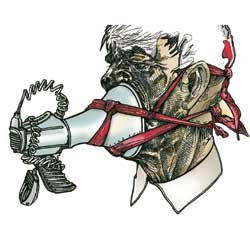 Is there finally a golden sunrise in the land of the Buddha? Has the veteran prime minister pulled out yet another rabbit out of his hat?
Is there finally a golden sunrise in the land of the Buddha? Has the veteran prime minister pulled out yet another rabbit out of his hat? The government has gone further than most previous governments to present a political proposal to the Maoists that is more inclusive and representational, suggesting a path for far-reaching future reforms. The only problem was that it came from a non-elected government, and had to be rejected by the political parties who were. And it didn't go far enough to meet the Maoists' own demands.
Given the current state of the state, let's not dismiss the proposal outright. It does cover a wide range of desirable reforms with strong implica-tions. Even the initial disappointment expressed by the Maoists and the political parties is partly justified since it omits a set of crucial points all related to the royal duties, powers, privileges, and responsibilities. As for the rest of the issues contained in the proposal, the only fault we can find with it is that it should have come 10 years ago.
Despite these omissions, the proposed position paper by the government outlining changes in the political landscape of the country is a good start and encompasses some of the ideas we have suggested in these pages in the past year. Civil society interested in seeing liberal democracy foster in the country should find its provisions refreshing. And many of the ideas do encompass demands of the Maoists, the parties, and the civil society:
. Regional level devolutionary governments to devolve the decision making power to the grassroots.
. Proportional representation system of election to help diminish marginalisation of the political and ethnic minorities.
. Setting aside 20 percent seats in both houses for women and other disadvantaged groups, land reforms, and an affirmative action program in the government jobs to ensure social justice and fairness.
. Provision of an interim government, three months prior to the election, to ensure a free and fair election.
. A referendum mechanism to give people sole power to practice direct democracy on issues of national importance.
. Transparency in party activities, financial dealings and internal democracy to reduce conflict of interests and to mitigate incentive for corruption.
. Strengthening the prime minister's executive power by allowing him or her to form a cabinet with experts from outside the parliament, and opening up other measures to lessen frequent dissolutions and enhance stability.
If implemented properly, the above main institutional reforms will make our infant democracy more liberal and responsible, and we should welcome these amendments. Whether it is a part of a negotiating strategy in the current peace talks, or an indication of a deliberate and rigid bottom line, there are four important items missing from the proposal.
. Protecting parliament from royal intervention
. The army under civilian rule
. Limiting royal perks
. Secularism
The success of the talks will depend on the approach that the government will take in handling these issues. Much of the acrimony between the monarch and the political parties stems from the use and misuse of Article 127. The probability of a successful negotiation is very low if this issue is not settled. Without going into much detail, a good compromise could be to bring Article 127 under the Parliament Act (see \'Ambiguity to Trust\', #144).
In recent interviews, the king has reaffirmed his commitment to constitutional monarchy and the multiparty system, but does acknowledge some technical flaws and ambiguity in both. The voice of the opposition forces in the country is quite firm and unified on Article 127, and it cannot be ignored. A mutually agreeable solution and a modified Article 127 must be worked out to ensure the sovereignty of the people's representatives.
Similarly, taking the commander-in-chief out of the current three-person National Security Council, or making him a non-voting member, and broadening the membership to include others will democratise its functioning. The king himself has said in a recent interview that the army is under the command of the civilian government-the prime minister and the defence minister. From his remarks it appears that he would be quite open to such forward-looking democratic reforms.
A mutual understanding in bigger political issues will make it easier for everyone to sit down and deal with the royal perks. A sensible proposal, without demeaning the throne and the crown, should not be difficult to prepare. King Gyanendra in recent interviews has shown extraordinary flexibility on these issues.
It is secularism that is more touchy. Do 80 percent of the people who call themselves Hindu, really need the country to be called a 'Hindu Kingdom' to protect our culture and religious heritage? A healthy debate and even perhaps a referendum can settle this issue once and for all, and everyone should guard against stoking the volatile vat where politics and religion are mixed. Don't go there.
But the larger question remains: does the government have the executive power to offer a set of these compromis-ing solutions to the Maoists? Will the Maoists accept these far-reaching democratic reforms? Or, do they have something else in mind they would like to accomplish through the constituent assembly? If so, what is it? If they are so committed to multiparty democratic system of government, which is allowed under the current constitution and strengthened with some additional modifications, then why can't they put their demand for a republic to a referendum? The government's current proposal has the referendum provision to accommodate that, so why do we need a constituent assembly?
The solution is out there, and within reach. This impoverished nation and its long-suffering people need a break. And they will reward the peacemakers.
Alok K Bohara, PhD, is professor of economics at the University of New Mexico. [email protected]



